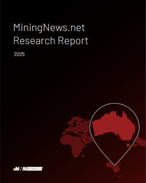This article is 4 years old. Images might not display.
MiningNews.net is making some of its most important coverage of the COVID-19 pandemic freely available to readers. For more coverage, please see our COVID-19 hub. To subscribe to MiningNews.net, click here.
COVID-19 has disrupted the lives of billions of people globally with devastating health and economic impacts and an associated spike in mental health issues.
Lifeline WA reported a huge spike in calls in March, and noted at the time that fly-in, fly-out workers would likely face extra pressures due to longer shifts and increased isolation on site due to the closure of facilities like gyms and wet messes.
Mental health was in the spotlight on Friday when a FIFO asphalt worker was shot dead by police in South Hedland after stabbing seven people at a shopping centre.
While the man didn't work for a mining company, Chamber of Minerals and Energy of Western Australia CEO Paul Everingham told The West Live podcast yesterday the industry would offer any potential support.
Everingham said the industry had put mental health "under the microscope" in the past 6-8 weeks.
"The health and wellbeing of our workforce is always top of mind for us and is always in the spotlight - it's paramount," he said.
"We're focused really closely at the moment because, yes, some shifts have gotten longer because of trying to reduce movement of our people and make sure we limit the spread, if possible, of COVID."
Northern Star Resources executive chairman Bill Beament says the industry's social license to operate is on the line if it doesn't get it right.
"As an industry, we must also be on red alert for mental health issues," he said last week.
"One of our sites recently had more emergency assistance program, EAP, inquiries in one week than it did in the previous 12 months."
As a former underground miner himself, Beament said anyone doing more than a 10-day shift underground would be "absolutely stuffed" so the company was also trying to manage fatigue.
Fortescue Metals Group CEO Elizabeth Gaines said the company was "very focused on mental health".
"We've added an additional rostered day off to manage fatigue," she said.
She said additional privacy rooms on site, as well as access to equipment and technology, were important for workers to remain connected to their families.
FMG recently gave workers' families gift cards for some "Easter cheer".
Teams were being innovative and moving gym equipment outside and setting up additional shade in grassed areas.
Gaines said FMG's family culture was a strong differentiator and the company already had chaplains onsite.
BHP has launched a new ‘wellbeing' page on its website that includes documents and videos on a wide range of metal health topics.
"We recognise the added pressure, and increased stress and anxiety that this has presented at work and in our daily lives, creating an ‘always on' mindset," the company said.
Rio Tinto has implemented additional mental health training and is providing care packages for FIFO workers.
Newcrest Mining is ensuring that all employees working remotely are included in daily site meetings to stay connected.
"Newcrest is acutely aware of, and has high priority to identifying additional stress and anxiety that some employees may experience in relation to the changed working conditions required to implement COVID-19 precautionary measures, including longer rosters and physical distancing," Telfer general manager Brett McFadgen said.
Workers are encouraged to discuss mental health during pre-start meetings.
"It's really worth noting that these open discussions have evolved from the past where traditionally some people did not feel as comfortable expressing their true feelings," McFadgen said.
Sites are offering in-room online fitness classes and have amended outdoor seating to comply with physical distancing rules.
"It would be fair to say that the impact of COVID-19 has impacted some people's stress levels, however at Telfer we have identified and continue to look for a range of activities and options to assist people to get through this as safely and healthy as possible in these unprecedented times," McFadgen said.
South32 has launched a dedicated mental wellbeing intranet site for its employees.
"It covers topics like how to get a good sleep, how to build and maintain resilience, how to have a conversation with your children about COVID-19, and how to speak with a workmate you might be worried about," a spokesperson said.
"It also includes a range of contact numbers for those who need further support and tips to help our people recognise when they may need more help."
South32 has also provided leaders with additional mental health training, and has been holding company-wide and operation-specific conference calls with health and wellbeing themes.
"Last week we had a guest speaker from Lifeline offering tips and strategies on how to look after ourselves and each other during these unusual times," the spokesperson said.
The CME has raised over $7 million for its COVID-19 Community Support Initiative from 20 of its members, the bulk of which will be distributed to Lifeline WA.
BHP made a separate $300,000 donation to Lifeline WA, while Newmont Australia contributed $125,000.
"No one's pretending working on a mine site isn't sometimes a difficult job, but we are definitely focused on what we can do to make that easier," Everingham said.
If you are feeling distressed, please call Lifeline on 13 11 14.
























